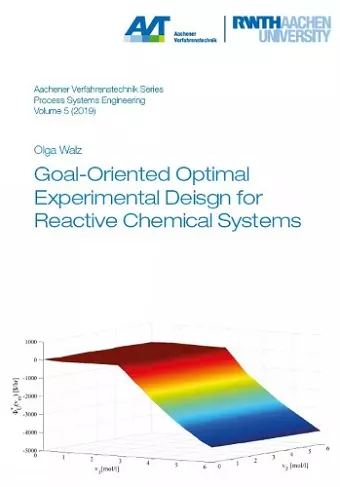Goal-Oriented Optimal Experimental Design for Reactive Chemical Systems
Format:Paperback
Publisher:Verlag G. Mainz
Published:17th Jul '19
Should be back in stock very soon

For the design and control of chemical processes, models that can accurately describe the physicochemical interactions of the process are needed. However, even with systematic modeling frameworks, the validation of predictive models is time and cost consuming. The generation of experimental data required for model validation often ensues in considerable effort and costs, which can be reduced via optimal experimental design (OED) methods. This thesis addresses the question on how to obtain predictive models for reactive complex chemical processes with the least experimental effort for a given application.
The different challenges encountered during modeling complex reactive systems are discussed in Chapter 2. To this end a tutorial is presented for modeling chemical systems exhibiting dynamics on different time scales owing to fast (equilibrium-limited), and slow (kinetically-limited) reactions. The presented systematic modeling approach, complementing existing literature, is based on index reduction of differential-algebraic-equation systems and is easily incorporated into typical modeling procedures. The approach is illustrated using Michaelis-Menten kinetics and is used for parameter estimation in the methyl benzoate hydrogenation case study.
In Chapter 3 OED for bounded-error estimation is covered. The worst-case OED formulation is based on literature and results in a bilevel optimization problem. In this thesis, an improved rigorous solution method for boundederror OED is proposed that can guarantee a global solution. The min-max bilevel OED problem is solved using an adaptation of a generalized semi-infinite program via restriction of the right hand side. The algorithm employed has the advantage that it guarantees a global solution for the OED assuming that both the upper-level and lower-level problems are solved globally. In the case of a local solution for the upper-level and a global solution of the lower-level problem, the solution is feasible, however, it is an upper bound of the global solution. For simple chemical reactions the OED problem can be solved globally in a couple of seconds. However, for more complex problems (modified prey-predator example) a global solution cannot be guaranteed with state-of-the-art global solvers, since the upper-level problem does not converge.
The bounded-error OED formulation is extended to a new goal-oriented OED formulation in Chapter 4 that tailors the model precision to its intended end application. In comparison to typical OED methods, instead of trying to improve the precision of all...
ISBN: 9783958862920
Dimensions: unknown
Weight: 168g
114 pages